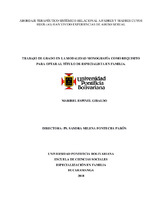| dc.contributor.advisor | Fontecha Pabón, Sandra Milena | |
| dc.contributor.author | Espinel Giraldo, Maribel | |
| dc.coverage.temporal | 2018 | |
| dc.date.accessioned | 2020-04-13T19:20:34Z | |
| dc.date.available | 2020-04-13T19:20:34Z | |
| dc.date.issued | 2018 | |
| dc.identifier.uri | http://hdl.handle.net/20.500.11912/5160 | |
| dc.description | 50 páginas | spa |
| dc.description.abstract | El abuso sexual desde la perspectiva sistémica implica una relación de poder complementaria en la cual el adulto obtiene gratificación sexual, aprovechándose de su condición de autoridad o de la cercanía afectiva con el niño o niña. En el abuso sexual intervienen diversos aspectos que contribuyen a que se mantenga como son las características de quien abusa. del niño o niña abusado, la desorganización al interior de la familia como puede ser la ausencia de limites claros, el aislamiento cultural del sistema familiar que limita la interacción con la familia extensa o la comunidad. En el proceso de intervención es fundamental vincular a la familia orientando los objetivos hacia la protección del niño o niña y su entorno que implica no solo reconocer la afectación para este y los integrantes del medio familiar sino también interrumpir el circuito de abuso, y la reparación del daño a partir de la expresión de emociones y su re-significación, así como la identificación de recursos y fortalezas. | spa |
| dc.description.abstract | Sexual abuse from the systemic perspective implies a complementary power relationship in which the adult obtains sexual gratification, taking advantage of his or her condition of authority or affective closeness with the child. Sexual abuse involves various aspects that contribute to maintaining the characteristics of abusers, abused children, and disorganization within the family such as the absence of clear limits, the cultural isolation of the family system that limits interaction with the extended family or community. In the process of intervention, it is fundamental to link the family with orienting the objectives towards the protection of the child and its environment, which implies not only recognizing the affectation for the family members but also interrupting the circuit of abuse and repair of the damage from the expression of emotions and their resignification, as well as the identification of resources and strengths. | eng |
| dc.format.mimetype | application/pdf | |
| dc.language.iso | spa | |
| dc.publisher | Universidad Pontificia Bolivariana | spa |
| dc.rights | Attribution-NonCommercial-NoDerivatives 4.0 International | * |
| dc.rights.uri | http://creativecommons.org/licenses/by-nc-nd/4.0/ | * |
| dc.subject | Familia | spa |
| dc.subject | Delitos sexuales | spa |
| dc.subject | Niños | spa |
| dc.subject | Terapia sistémica | spa |
| dc.subject | Trabajo social con niños | spa |
| dc.title | Abordaje terapéutico sistémico-relacional a padres y madres cuyos hijos (as) han vivido experiencias de abuso sexual | spa |
| dc.type | Especialización | spa |
| dc.publisher.department | Escuela de Ciencias Sociales | spa |
| dc.publisher.program | Especialización en Familia | spa |
| dc.type.hasVersion | publishedVersion | spa |
| dc.description.sectional | Bucaramanga | spa |
| dc.description.degreename | Especialista en Familia | spa |


